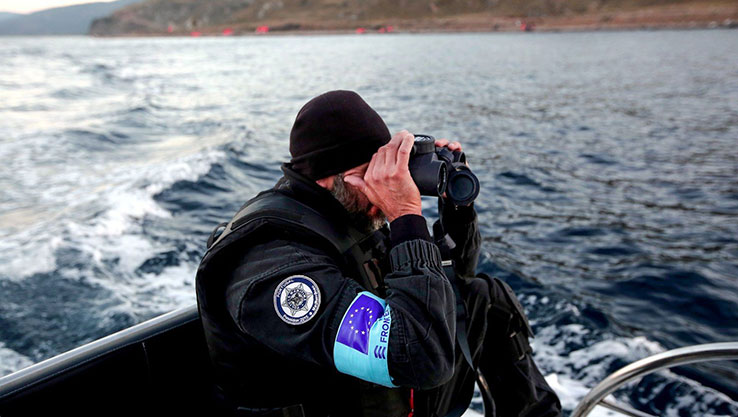Ismail Kamberi

In 2015, EU member states deployed police units to North Macedonia’s border with Greece to assist in handling the refugee crisis. The cooperation has been effective but has lacked transparency.
The so-called “Balkan Route” has been one of the main paths for migrants and refugees to Western Europe. The migrants who arrived in Greece in 2015 had a direct influence on this route with their intention to reach the closest borders of EU member states through the Republic of North Macedonia, Albania and Serbia. In 2015, 764,033 illegal entries of migrants were detected in the Balkans in an attempt to cross the Serbian border with Hungary to further continue their journey to the developed countries. The numbers attest to fact that the challenges of the Balkan migration route cannot be overcome solely by the efforts of one individual country or an EU member state, but through a “joint cross-border approach based on cooperation”.
Consequently, in May 2015, the European Commission established the European Agenda on Migration to address the challenges relating to illegal migration, borders, asylum and legal migration. Due to EU’s inability to resolve the migrant issue through national policies and activities of individual EU member states, on October 25th, 2015, Jean-Claude Juncker invited the leaders of Albania, Austria, Bulgaria, Croatia, the Republic of North Macedonia, Germany, Greece, Hungary, Romania, Serbia and Slovenia to meet in Brussels. The meeting resulted in a “17-point plan of action”, which includes measures for tackling the migration crisis by guiding the operation of the EU agencies towards establishing a system for exchange of information and strengthening the Frontex Western Balkans Risk Analysis Network, with enhanced reporting from all participants.
Cooperation between the Republic of North Macedonia and Frontex
Working Arrangement
On January 19th, 2009, Frontex and the Ministry of Interior of the Republic of North Macedonia signed a Working Arrangement, which entered into force on the following day, January 20th, 2009. The objective of this arrangement is to combat illegal migration and related cross-border crime through information exchange, risk analysis, joint training, research and development projects, joint operational activities and participation in pilot projects, under the authority of the Executive Director of Frontex.
The arrangement gives the Republic of North Macedonia access to Frontex’s services for strengthening the capacities for border control through joint operations, training and development. Such activities involve observation of Frontex-coordinated joint operations in EU countries, cooperation and participation in Frontex-coordinated operations on common borders, such as the border with Greece, information exchange, participation in relevant sessions and meetings of the Frontex Risk Analysis Network (FRAN), etc.
Status Agreement
In July 2018, EU Commissioner Dimitris Avramopoulos and Macedonian Interior Minister Oliver Spasovski signed a Status Agreement that would allow Frontex to deploy units to Macedonia. The agreement will enable Frontex to carry out joint operations in and together with Macedonia in the event of serious or pressing migration issues. The draft version of this agreement will allow a team of a Frontex member state to carry out activities on the territory of the Republic of North Macedonia under the leadership and in the company of our competent authorities. Nonetheless, this clause stipulates that Frontex representatives may communicate their views through they coordination officer to the representatives of the Macedonian police authorities.
In that event, the national authorities need to consider any such views and fully adhere to them. However, this provision may cause inconsistencies in the implementation if the views under consideration are not in accordance with the appropriate (effective) national legislative framework of our country. Hence, there is a potential risk of possible illegal actions. Due to the lack of public awareness of this issue, there is a need for wider public debate until the ratification of the Agreement in order to improve its content.
 Source: makfax.com.mk
Source: makfax.com.mk
Foreign Border Guard from the EU and other Countries to the Republic of North Macedonia
Since 2015, the Republic of North Macedonia has closely cooperated with certain EU member states and Serbia in an effort to handle the refugee crisis more successfully, after it reached its “peak”. In 2015, the Republic of North Macedonia stressed at European and regional level the necessity of material and logistical support to effectively deal with illegal migration and offer humanitarian support to refugees. Subsequently, an international cooperation of eight countries has been established, including the Czech Republic, Poland, Slovakia, Austria, Hungary, Slovenia, Croatia and Serbia.
The purpose of the cooperation is to provide Macedonian border police with assistance from foreign police officers in patrolling the south border with Greece and in performing their daily duties. Furthermore, the cooperation involves joint training, information exchange and coordination. One hundred and sixty six (166) foreign police officers guarded the Macedonian border at the expense of the EU. The number of foreign police officers has gradually increased, and new contingents arrived in the country in 2019.
Even though Article 5 of the Law on State Border Protection stipulates that border control falls within the competence of the Ministry of Interior and that the police departments of the Ministry carry out border control activities, Article 59 of the same law provides for foreign police presence. Namely, this article stipulates that, based on a ratified international agreement, police officers from other countries may perform activities related to border control and other matters related to international police cooperation. On the territory of the Republic of North Macedonia, foreign police officers may use technical equipment and vehicles with symbols, wear uniforms, carry weapons and other means of coercion, under the conditions and in a manner determined by an international agreement.
In this regard, Macedonia concluded with Serbia, Hungary and Austria a Memorandum of Understanding, which is different from the usual agreements signed between countries. The key distinction between this Memorandum and other agreements is that in case of dispute other agreements can be executed through the judicial authorities, whereas this Memorandum of Understanding cannot be. More importantly, the Assembly of the Republic of North Macedonia has not ratified the signed memorandum. It was never published in the Official Gazette, which makes it only a declarative document. Nonetheless, that did not stop foreign police contingents from coming to our borders in the period from 2015 to 2019.
Need for Transparency
The 2015 refugee crisis challenged the stability of the EU’s internal and external border control. The Balkan countries played a key role in the management and control of EU’s external borders, supported by substantial financial and technical resources provided by the EU, its agencies and EU member states. Despite strengthening police capacities and establishing a good practice for cooperation with foreign police authorities, one cannot but emphasize the lack of transparency in the processes.
The Memorandum of Understanding signed with foreign police authorities has not been made public, the instrument was not ratified by the Assembly and the exact number of foreign police officers deployed to the Republic of North Macedonia is not available on the websites of the competent authorities. This is a result of the country’s flexible approach to the cooperation with other countries in dealing with the refugee crisis.
Media coverage and statements from the Ministry of Interior are the only sources of information on the situation at the borderlines. Furthermore, the political, financial and other obligations arising from the Frontex Status Agreement should be discussed publicly with all stakeholders, including representatives of relevant institutions, academia and experts, in order to improve the country’s position on the issue. Finally, after the ratification of the agreement, its implementation needs to be monitored.
Please refer to the Terms before commenting and republishing the content.
Note: The views and opinions expressed in this article are those of the author and do not necessarily reflect the views of the Institute of Communication Studies or the donor.


